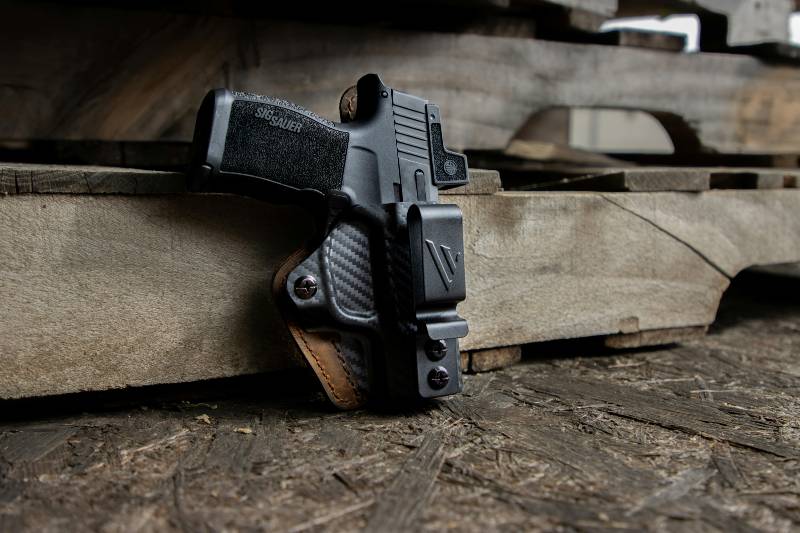

Texas, a state with a deep-rooted gun culture, has seen significant changes to its open carry laws in recent years. These updates can be confusing for residents and visitors alike. You might have questions, such as:
This guide breaks down the essentials of open carry in Texas, clarifies your rights, and answers these common questions.
If you have questions about open carry laws in Texas, please contact the San Antonio criminal defense lawyers at Austin Hagee Law Firm today.
Contents hideOpen carry refers to the lawful carrying of a handgun in a holster that is visible to the public eye. For example, a gun secured in a hip or shoulder holster is readily apparent to anyone nearby and is being openly carried.
Concealed carry involves keeping it out of public sight by hiding the firearm under clothing, without a visible firearm outline or bulge.
Texas Penal Code Section 46.02 outlines the circumstances in which carrying a handgun in public is considered legal.
As of September 1, 2021, House Bill (HB) 1927, known as the Constitutional Carry Law, allows most Texans over the age of 21 to carry a handgun without a permit, either openly or concealed. Despite its bold name, Constitutional Carry is not a right in every situation and is subject to some limitations.
Before this, a License to Carry (LTC) was mandatory if you wanted to openly carry your gun in Texas. However, HB 1927 removed this obligation, enabling eligible individuals to openly carry a handgun in a holster without a LTC.
Under Texas law, you must meet specific criteria to carry your gun openly.
Generally, you must be 21 or older to be eligible to carry a handgun in public openly.
Beyond the age requirement, Texas law also stipulates that open carry eligibility is contingent on having no felony convictions that would disqualify them from firearm possession under federal law. Specifically, individuals must:
In Texas, you must carry your handgun openly in a shoulder or belt holster. This helps ensure the weapon is properly secured and not readily accessible in an unsafe manner.
Open carry in Texas is generally permitted in most public places where concealed carry of handguns was previously allowed. However, there are specific locations where open carry remains prohibited, including:
These requirements attempt to balance the need to ensure public safety while upholding the rights of lawful gun owners to openly carry handguns. Complying with these regulations is essential for anyone wishing to exercise their open carry privileges in Texas.
Texas law allows you to carry a handgun in your vehicle without a license, as long as it’s not in plain view, and you are not otherwise prohibited from possessing a firearm. However, federal laws regarding firearm transportation may apply, especially if you’re crossing state lines.
Federal law does not prohibit the public from openly carrying firearms. However, specific rules may apply to federally owned or operated property. Additionally, federal laws interact with state regulations, particularly concerning limiting certain individuals, like convicted felons, from owning firearms.
It’s important to note that federal background checks are mandatory before acquiring a firearm from a licensed dealer anywhere in the United States, including Texas.
While Texas has established a framework for open carry, some cities, and municipalities can enact stricter regulations within their jurisdictions. This means the legal landscape of open carry might differ slightly depending on your location within the state.
It’s always best to double-check local regulations before openly carrying a firearm in any Texas city or municipality. Also, be aware of signage that may be posted on business establishments that you enter.
While this guide provides a general overview, Texas open carry laws can be complex. If you have doubts about your eligibility, questions about the rules of carrying in a specific location, or are accused of violating open carry laws, it’s crucial to consult a San Antonio criminal defense lawyer.
Texas’s open carry laws offer freedom and come with responsibilities on carriers. Austin Hagee Law Firm’s experienced criminal lawyers are well-versed in these complex laws and have a proven track record of success in open carry cases.
We are dedicated to providing our clients with comprehensive legal advice and thoughtful representation. Contact us today for a consultation to discuss your rights, explore your options, and protect your interests. With over a decade of expertise, you can trust that your case is in good hands.
As of September 1, 2021, an LTC is not mandatory for open carry, provided you meet the qualifications.
House Bill 1927 removed the training requirements for open carry in Texas. However, the Texas Department of Public Safety provides a free firearm safety course for interested parties.
Non-residents legally eligible to possess firearms can open carry in Texas, provided they meet the same age, eligibility, and holster requirements.
Texas Penal Code Section 22.07 details the crime of terroristic threats. This crime can apply to anyone who displays a firearm in a way that is intended to create fear of imminent serious bodily injury. Typically, open carry under the law will not meet the threshold for a terroristic threat charge.

Austin M. Hagee is a trusted and proven San Antonio trial lawyer who tirelessly defends his clients’ constitutional rights. As a former prosecutor turned nationally recognized criminal defense attorney, Austin has the knowledge and expertise to get the best possible outcome for his clients.